'Modi's initial forays into foreign policy had the flavour of Aswamedha Yagas launched by ancient kings to conquer the world.'
'He overcame the hesitations of history and explored unconventional ways to win friends and influence people.'
A fascinating excerpt from Ambassador T P Sreenivasan's new book, Modiplomacy -- Through a Shakespearean Prism.
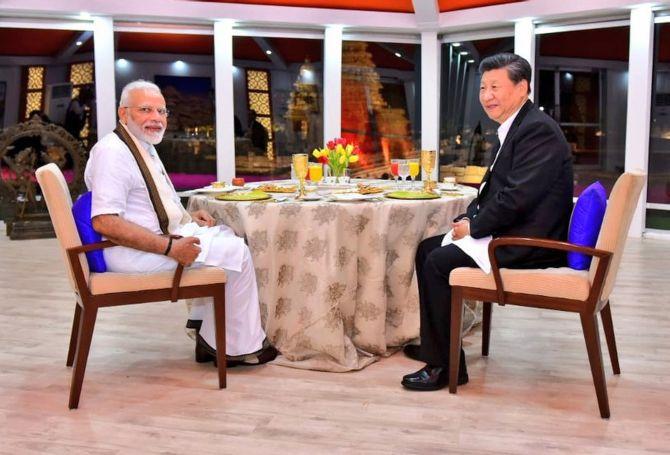
Modi's biggest challenge was China, which was at the root of every issue he faced in external relations, including the neighbourhood, which was deeply influenced by China emerging as an alternative to India as a regional power, capable of providing economic and political support to the countries in South Asia.
China's Belt and Road Initiative offered an attraction for them to build their infrastructure and their development plans became an instrument of China's expansionism.
Modi maintained a continuous dialogue with China and did his best not to provoke it, but China did not help to resolve any of the old problems and added new ones involving serious threat to India's security and sovereignty like Doklam and the BRI through Pakistan occupied Kashmir.
The border discussions made no breakthrough and China created obstacles to India's minor aspirations like the membership of the NSG and the listing of Masood Azhar as a global terrorist, not to speak of India's candidature for permanent membership of the UN security council.
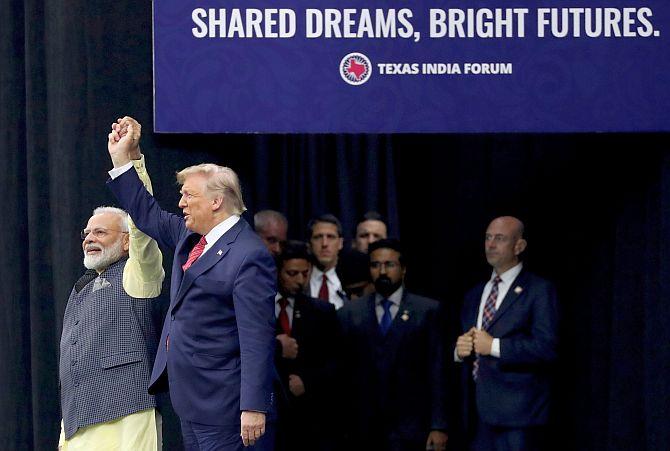
The greatest success of Modi was the 'new symphony' he choreographed with the United States from 2014 to 2016, taking India closest to the United States as a 'close defence partner' of the US as part of the Make in India programme, including co-designing and co-manufacturing of defence equipment.
He signed defence agreements with the United States, which his predecessors had hesitated to do.
The second visit of any US president to India in 2015 resulted in a historic agreement on cooperation between the two countries in the Asia-Pacific.
The 'Quadrilateral' for cooperation among the US, India, Japan and Australia began to take shape.
Investments grew and it appeared that India-US relations would reach unprecedented levels.
Both China and Russia watched these developments with concern and began showing signs of diversifying their relations in South Asia.
But like the deus ex machina, a totally unexpected person or event that descends on the path of Shakespearean heroes, the advent of President Donald Trump altered the course of India-US relations.
It appeared initially that Trump would be a valuable partner in our fight against terrorism, in balancing China and in building trade and economic growth, but his isolationist 'America First' approach and dislike of globalism made the trajectory of bilateral relations unpredictable and rough.
Trump did not go against India's interests in any significant way, but his immigration and trade policies caused concern in India.
In other words, the major investment that Modi made in cultivating President Obama and laying the foundations of a significant partnership with the US as a pivot to India's foreign policy did not create the intended benefits.
Trump's policy of withdrawing assistance to Pakistan for failing to fight terrorism was a blessing, but his dependence on Pakistan to find a compromise arrangement in Afghanistan, together with Taliban and to withdraw his troops from Afghanistan was a setback for India.
At the time of Doklam and other instances of China's adversarial approach to India,
Trump's silence was eloquent.
Modi came to the inevitable conclusion, therefore, that he could not rely on the US as a strong partner in the circumstances, but remained engaged with the US on the basis of the existing arrangements for cooperation.
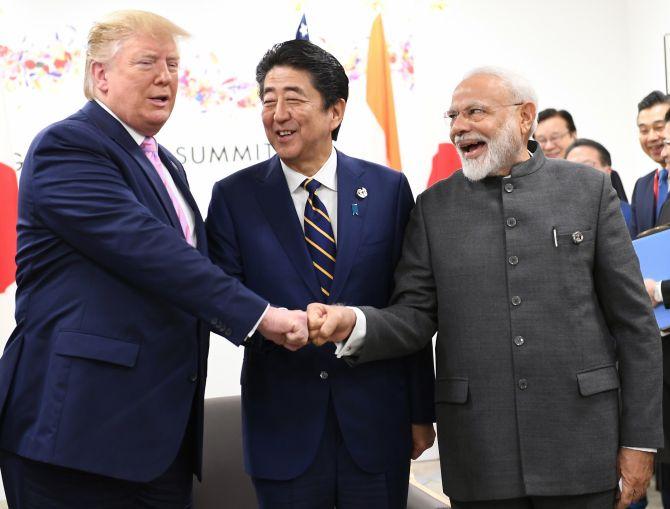
India has long dreamt of becoming a fourth pole in an emerging global order.
The time has come for us to pursue this dream now that the world is in a flux and the three existing poles are not able to cover the entire globe.
India, having experimented with embracing the United States till 2017, feels it necessary to find an alternative and neither China nor Russia holds any attraction for us.
India too has no constituency of its own, either in our neighbourhood or elsewhere, as the glue of non-alignment has withered away.
The emergence of Narendra Modi as the leader of the biggest democracy presents an opportunity for India to build a string of friendships with common aspirations for beneficial cooperation.
Even in the absence of overwhelming economic and military power, India may be able to build an affinity with a variety of countries across continents and ideological affinities.
Countries like Japan, Germany, Australia, Brazil, South Africa, Indonesia, Malaysia, UAE, Saudi Arabia and Israel come to mind.
One positive development in this context is the overwhelming support India has received from the international community for Modi's relentless fight against terrorism, exemplified in the intervention by Trump to de-escalate the situation on the South Asian subcontinent and the listing of Masood Azhar as a global terrorist.
We have done so without deploying our army abroad or launching a hunt for terrorists around the world.
The United Nations, which has been unable to define terrorism so far because of it being confused with freedom struggles, has come out clearly against terrorism.
There was no international criticism of the attack on Balakot.
If India's efforts to save the world from the scourge of terrorism succeed, India will earn a special place in the global community.
Modi's initial forays into foreign policy had the flavour of Aswamedha Yagas launched by ancient kings to conquer the world.
He overcame the hesitations of history and explored unconventional ways to win friends and influence people.
But soon enough, he was faced with the realities of history and geography, which prompted him to proceed with caution.
But his definition of national interests and pursuing them with vigour gave him the image of a man of action and the powerful leader of a potential great power.
The second term, which was, among other things, a reward for Modi's world view and foreign policy has provided him and India with an opportunity to consolidate the gains of the past, apply the necessary correctives and move forward.
The strong second mandate has given Modi a stature similar to those of Xi Jinping and Vladimir Putin in terms of stability and that too through the ballot box.
Western prejudices articulated close to the elections against Modi must evaporate with the massive mandate.
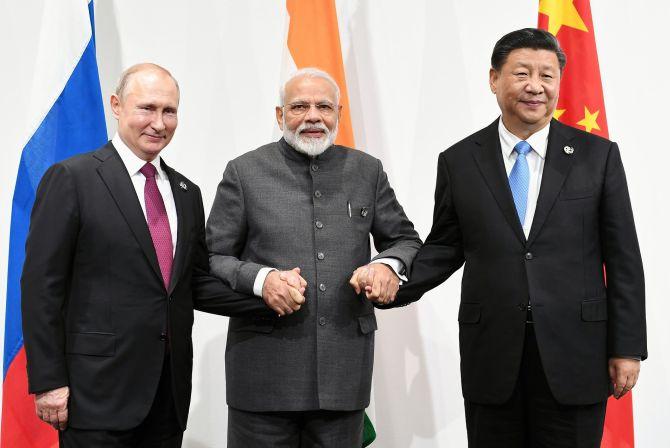
Trump has already indicated his willingness to work closely with Modi.
These advantages, together with Modi's penchant for international affairs, a congenial economic climate and a broad consensus inside the country in his favour, should give his foreign policy a new thrust and vigour.
Modi is faced with a number of tough foreign policy challenges in his second term.
The US has indicated that it would be willing to work with Modi on the basis of the foundation laid by previous presidents of the United States and that it would continue its strong partnership with India.
At the same time, on issues like trade, immigration and defence cooperation, Donald Trump's views would prevail.
The dangers of a tight embrace with the United States were all too evident in Modi's first term.
China has made no concessions on any of the problems that have plagued bilateral relations since the sixties.
Russia's steadfastness also cannot be taken for granted.
Steering clear of these inherent hazards even while cooperating with them and finding a niche for India in the emerging multipolar world should be the objective of Modiplomacy 2.0.
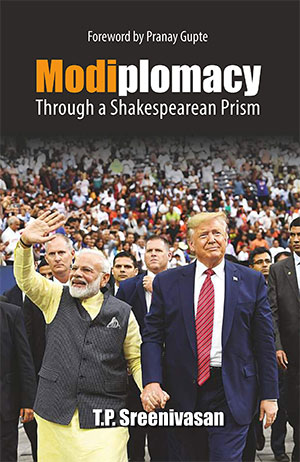
Excerpted from Modiplomacy: Through a Shakespearean Prism, by Ambassador T P Sreenivasan, Konark Publishers, with the publisher's kind permission.


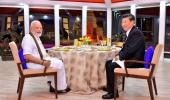
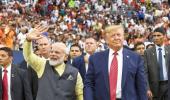

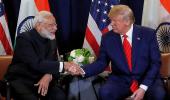






 © 2025
© 2025